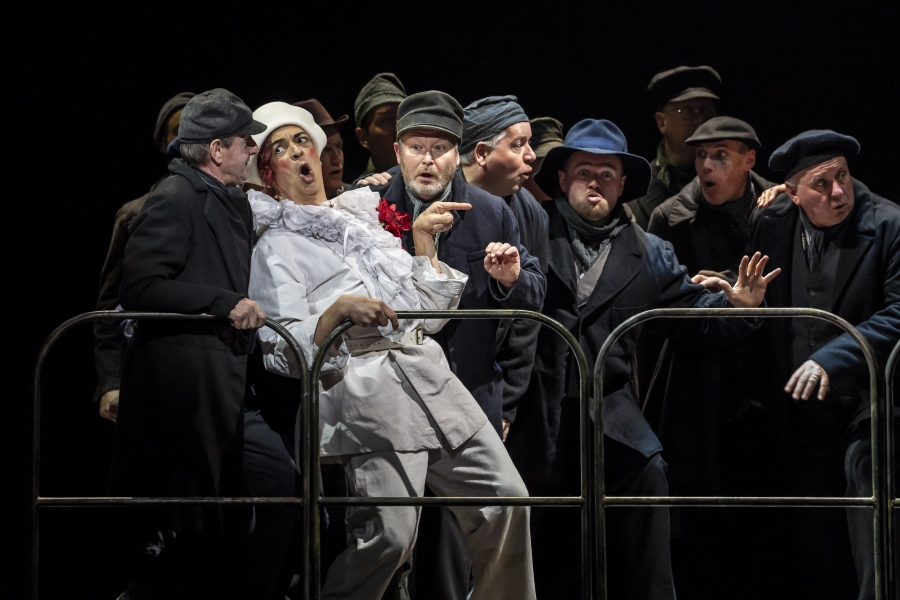
****
The first instalment in this year’s WNO Spring season was a revisitation of a classic, and so it feels very balanced that we are now invited to explore the dark (and, in places, insalubrious) world of a more esoteric work, one that was produced well after the heyday of classical opera and that is perhaps less frequented than it deserves to be.
Benjamin Britten’s Death in Venice is more rethinking than adaptation of the Thomas Mann novella of the same title. It is true that some of the themes remain at the forefront – first and foremost that of mortality, especially when we consider that this was Britten’s last opera, and one that he worked on while knowing that he was battling a potentially deadly disease – in book and opera alike; but Britten’s tale, compared to Mann’s, is tinged with a much greater degree of eroticism, and more inclined to explore the sordid aspects of the story. The overall mood, as a result, feels rather more morbid and haunting than maudlin; the music, which is full of little trills and dissonances, emphasises this feeling. This is an opera for a completely new era, with characters that are all too human to the point of extreme fragility, and no room for broad arias and tongue-in-cheek duets. True, there are moments of humour, inevitably dark as it is, and moments of sheer beauty; contemplation of beauty, and the true meaning of the term, is one of the driving themes of the work. But what lingers after the end is a feeling of having witnessed something that should perhaps have been private, an exploration of some of the hidden facets of human nature that is deliberately uncomfortable to partake in.

Marc Le Brocq and Antony Cesar
The WNO production is acutely aware of all of this, and arranges its stage presentation in such a way that it is easy for it to lean into the dark undercurrents of Britten’s work. After a series of overcrowded stage designs, it is good to see one that is instead stripped-back to the most basic of components, relying on screen projections in the background to give depth to the scenes it presents. The latter is a particularly clever idea: together with the mostly muted tones of the costumes, it gives the feeling that the whole performance is seen through a sepia filter, which makes it feel distant in time and a little faded, melancholy like an old memory. Another thing the stage design manages to do is vividly evoke the titular city: Venice may be a mere backdrop in Mann, but in Britten it is a character almost as much as the aged writer Aschenbach and Tadzio, the young Polish boy with whom he becomes infatuated. Anyone who has known and loved Venice will recognise it here: the music channels the slow lapping of its waves and the oppressive blowing of the Scirocco, and the imagery on the screen is full of water, slowly moving oars, and pallid skies, adding depth to the illusion. When there are sparks of colour – a flash of gold, a perturbing streak of red – the symbolism comes out all the stronger against this background.

Antony Cesar and Riccardo Saggese
One of the most interesting, and most daring, choices is to bring in circus artists – through a collaboration with No Fit State, by now requiring no introduction in Cardiff – for Tadzio and his family. These silent parts were imagined originally as being portrayed through the medium of ballet, and to do it through the more boisterous art form of circus may sound like a hazard. If it is a hazard, though, it is a very successful one: the aerial performances, in particular, are truly a manifestation of beauty, stunningly embodying the divine element evoked by the libretto. Antony César as Tadzio is a presence whenever he appears on stage, and as unsavoury as Aschenbach’s infatuation inevitably appears to a contemporary sensitivity, it is channelled in such a way through these performances that it becomes, in the moment, comprehensible.
Aschenbach himself – inevitably the focus of the action throughout, in spite of his passivity – is brought to the stage in a considerate, clever performance by Mark Le Brocq, who is aware of the vulnerabilities, hypocrisies, and even the pathetic sides of his character, and portrays them delicately and convincingly. We may laugh at Aschenbach or shake our heads at him at various moments as the story unfolds, but by the end we feel for him, and that is no small feat considering the story of Death in Venice. Even so, the dominant performance probably comes from Roderick Williams, a true force of nature covering six separate roles and acting as a red thread connecting them all as a series of manifestations of the Dionysiac – which in Britten’s work has more than a touch of the devilish. His hotel barber is a perfectly tuned comedic touch in an otherwise rather dark part of the opera, and his Dionysus, when he finally appears as himself, is powerful and threatening in equal measure. Opposite the latter we find an outstanding vocal performance by Alexander Chance as the Voice of Apollo, successfully channelling a bit of the otherworldly.Death in Venice is a challenging work: dissonant and dark in its themes, occasionally bleak, asking more questions than it provides answers, it demands much of performers and audience alike. The WNO production acquits itself well in not shying away from the discomfort that the work requires, and immersing itself fully in the murky atmosphere of the Venetian lagoon and in the even murkier depths of the protagonist’s mind. Let’s hope this will open a door for more new production of Britten’s work, bringing the spotlight back onto an author who much deserves it.
Wales Millennium Centre until Saturday, March 9 then touring until Saturday 11 May 2024
Cardiff, Llandudno, Southampton, Oxford, Bristol, Birmingham
Main image Roderick Williams
Images by Johan Persson